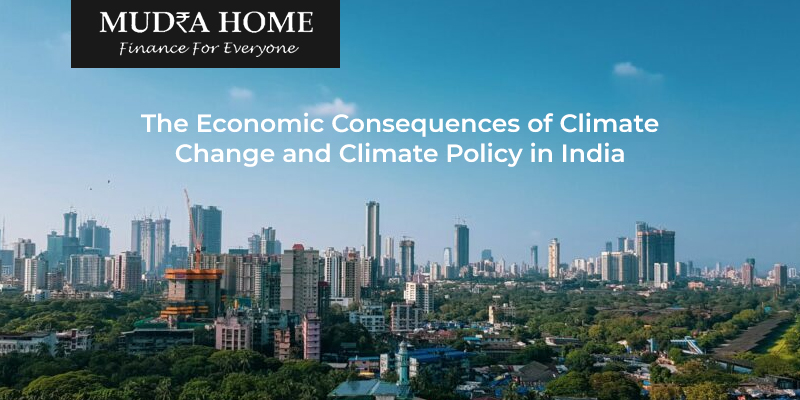Climate change is a global phenomenon that knows no borders, impacting economies, ecosystems, and societies around the world. In India, a nation of over 1.3 billion people, climate change poses significant economic challenges and opportunities. This blog explores the economic consequences of climate change in India and how climate policy can mitigate these challenges while fostering sustainable development.
The Economic Toll of Climate Change
- Agriculture: India’s economy heavily relies on agriculture, which is highly sensitive to climate variability. Erratic rainfall, prolonged droughts, and extreme weather events have disrupted agricultural productivity, leading to crop failures and income loss for farmers. Climate change-induced challenges have the potential to exacerbate food security concerns and increase the vulnerability of rural communities.
- Water Scarcity: Changing precipitation patterns and glacial melt in the Himalayas threaten India’s freshwater resources. Water scarcity impacts both agriculture and industry, potentially leading to higher production costs and reduced economic growth.
- Rising Sea Levels: India’s extensive coastline, including major cities like Mumbai and Kolkata, is susceptible to rising sea levels. Increased flooding and coastal erosion can damage infrastructure, disrupt trade, and displace communities, resulting in significant economic losses.
- Health Care Costs: Rising temperatures and changing disease vectors contribute to an increase in health care expenditures. The economic burden of healthcare due to climate-induced health issues affects both the public and private sectors.
Opportunities for Sustainable Growth
While climate change poses economic challenges, it also presents opportunities for sustainable growth and development in India.
- Renewable Energy: India has made significant strides in renewable energy production, particularly in solar and wind power. The development of a green energy sector not only reduces greenhouse gas emissions but also stimulates economic growth, creating jobs and investment opportunities.
- Sustainable Agriculture: Adapting agriculture to changing climatic conditions through practices such as precision farming, crop diversification, and water management can improve resilience and enhance agricultural productivity.
- Infrastructure Development: Investing in resilient infrastructure, such as flood defenses, green urban planning, and disaster preparedness, can reduce the economic costs of climate-related disasters.
- Green Technology: Innovation and investment in green technologies can stimulate economic growth, as it opens doors for export opportunities and reduces environmental impacts.
The Role of Climate Policy
Effective climate policy is essential to addressing the economic consequences of climate change in India.
- Mitigation: India’s commitment to the Paris Agreement includes reducing emissions and increasing the share of renewable energy in its energy mix. Climate policies that promote emissions reductions can contribute to a cleaner, more sustainable economy.
- Adaptation: Climate adaptation policies should focus on building resilience in vulnerable sectors, such as agriculture and water resources, to minimize economic losses.
- Sustainable Finance: Policies that encourage sustainable finance and investments in clean technologies can accelerate the transition to a low-carbon economy.
- International Cooperation: Collaborative efforts with other nations, such as technology transfer and financial support, can help India achieve its climate goals while stimulating economic development.
Challenges in Implementation
Implementing effective climate policies in India faces several challenges:
- Fiscal Constraints: The Indian government needs to allocate resources for climate-related initiatives while addressing other pressing economic issues, such as poverty, infrastructure development, and healthcare.
- Capacity Building: Effective climate policy requires institutional capacity and technological expertise, which may need to be developed or improved.
- Political Will: Policymaking can be influenced by various interest groups, making it crucial to garner political will and public support for climate initiatives.
Conclusion
The economic consequences of climate change in India are profound and multifaceted, affecting sectors from agriculture to healthcare. However, climate policy can mitigate these challenges and create opportunities for sustainable growth. By pursuing a balanced approach that combines mitigation and adaptation strategies, India can work toward a more resilient and prosperous future, all while contributing to global efforts to combat climate change.
